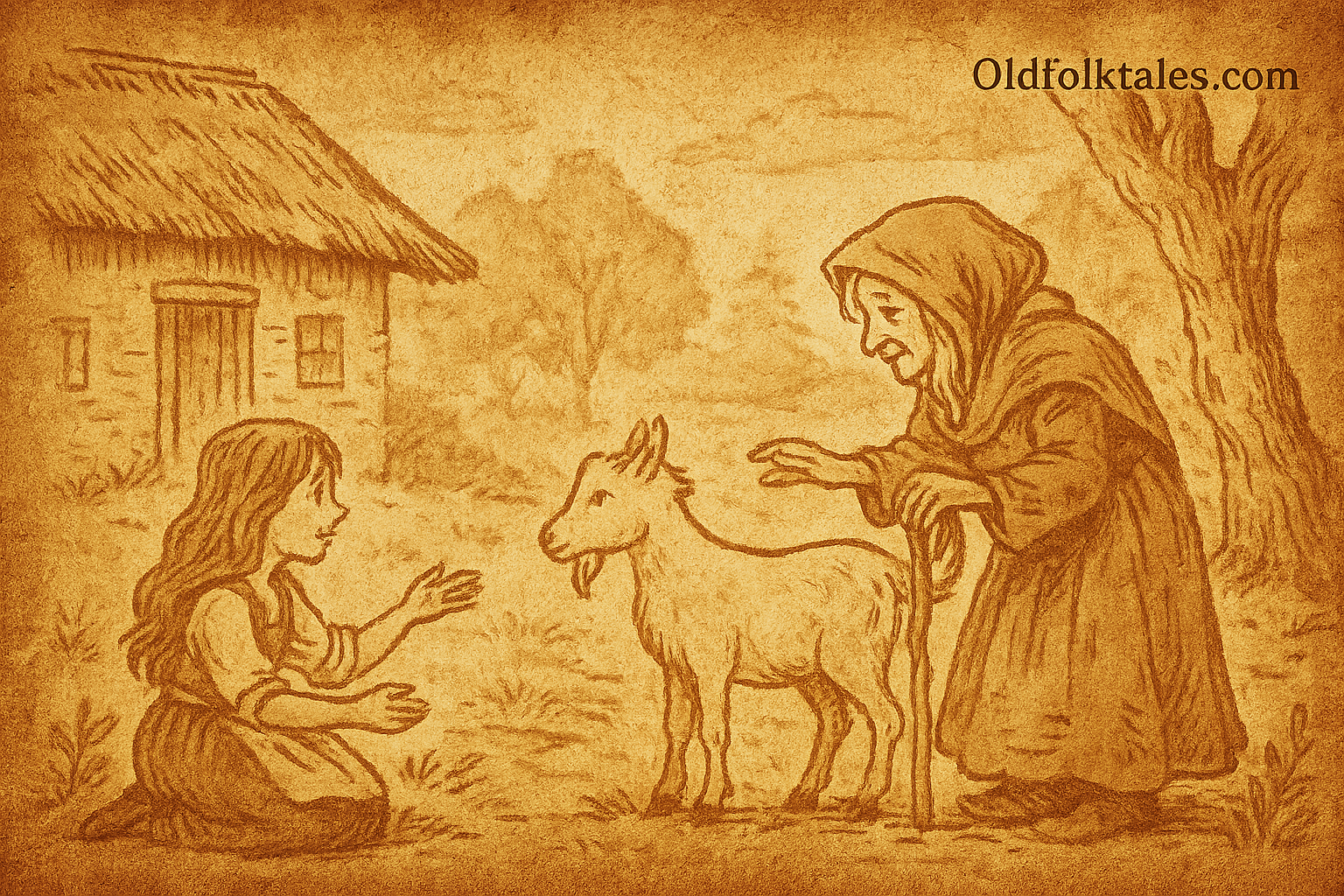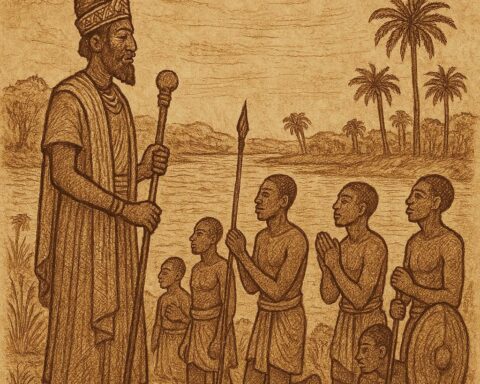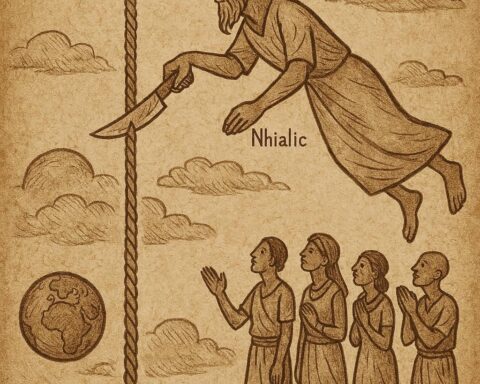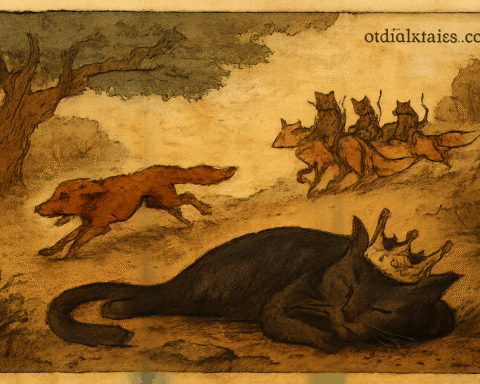Deep in the heart of an ancient forest, where tall pine trees whispered secrets to the wind and morning mist clung to moss-covered stones, stood a small cottage that housed three most unusual sisters. They had lived in this secluded woodland home for as long as memory served, never venturing beyond the forest’s edge and never encountering another soul.
The eldest sister, One-Eye, possessed exactly what her name suggested, a single, large eye positioned directly in the center of her forehead. To her, this seemed perfectly normal, for she had never known any other way of seeing the world. Her middle sister, Three-Eyes, bore one eye in her forehead like One-Eye, but also sported an additional eye on each side of her face, giving her an extraordinary range of vision that could peer in multiple directions at once.
But the youngest sister was considered the strangest of all. Her name was Two-Eyes, and she possessed two ordinary eyes positioned exactly where most people would expect to find them, one on either side of her nose. In this peculiar household, her perfectly normal appearance marked her as the odd one out, the sister who didn’t belong.
Also read: Mouse Deer’s Greatest Adventures
Because Two-Eyes looked different from her siblings, One-Eye and Three-Eyes felt deeply ashamed of her presence. They treated her with constant cruelty, forcing her to wear their tattered, outgrown clothing while they dressed in the finest fabrics. At mealtimes, they served themselves generous portions of fresh bread, rich stews, and sweet pastries, leaving only cold scraps and stale crusts for their youngest sister. Two-Eyes often went to bed with her stomach growling from hunger, her heart aching from loneliness.
The family’s only livestock was a gentle goat with a coat as white as fresh snow, and each day Two-Eyes was given the task of leading this animal to the meadow beyond the cottage to graze on sweet grass and wildflowers. One particularly difficult morning, after her sisters had been especially cruel and left her with nothing but moldy bread for breakfast, Two-Eyes sat in the sun-dappled meadow and wept bitter tears of despair.
Through her blur of tears, she suddenly noticed an elderly woman standing before her. What made Two-Eyes gasp with wonder was that this mysterious stranger possessed two eyes, positioned exactly like her own, the first person she had ever encountered who looked remotely similar to herself.
“What troubles you so deeply, my dear child?” the old woman asked, her voice gentle and warm with compassion.
“It’s my sisters,” Two-Eyes sobbed, wiping her eyes with the back of her hand. “They despise me because I’m different, and they never give me enough food to satisfy my hunger.”
The old woman’s eyes sparkled with ancient wisdom and kindness. “Dry your tears, sweet girl! From this day forward, you need never go hungry again. Simply speak these words to your goat:
‘Bleat, goat, bleat, And bring me lots to eat!’
Then you shall feast like royalty. When your hunger is satisfied, say:
‘Bleat, goat, bleat, I’ve had so much to eat!’
And everything will vanish without a trace, just like this”
With those words, the mysterious woman disappeared as suddenly as she had appeared, leaving only the faint scent of wildflowers in the air.
Two-Eyes could hardly believe what she had witnessed, but her growling stomach urged her to test the magic immediately. Looking at her placid goat, she spoke the enchanted words:
“Bleat, goat, bleat, And bring me lots to eat!”
The goat responded with a gentle bleat, and instantly the most remarkable sight appeared before Two-Eyes. A small wooden table materialized in the grass, accompanied by a comfortable chair. Upon the table lay a crisp white tablecloth, delicate china plates, gleaming silver utensils, and dish after dish of the most delicious-smelling food she had ever encountered roasted meats, fresh vegetables, warm bread still steaming from the oven, and pastries that glistened with honey.
“This is certainly better than stale leftovers!” Two-Eyes exclaimed with joy.
She ate until her stomach was pleasantly full for the first time in years, savoring every morsel of the magical feast. When she could eat no more, she spoke the second charm:
“Bleat, goat, bleat, I’ve had so much to eat!”
Again the goat bleated, and the entire feast vanished without leaving so much as a crumb behind.
“And that,” Two-Eyes laughed, “is definitely better than washing dishes!”
That evening, when Two-Eyes returned home, she left her bowl of cold leftovers completely untouched. Her sisters paid no attention until after she had retired to her small bed in the cottage’s cramped attic.
“Look here, sister,” Three-Eyes observed suspiciously. “Our little Two-Eyes hasn’t eaten a single bite of her food tonight.”
One-Eye frowned, her single eye narrowing with suspicion. “How very strange indeed. Perhaps someone else is providing her with meals? Tomorrow I shall accompany her to the meadow and keep my eye on her activities.”
The next morning, when Two-Eyes prepared to lead the goat to pasture, One-Eye announced firmly, “I’m coming along to ensure you tend the goat properly.” She followed her younger sister to the meadow and watched her with unwavering attention throughout the entire day. With One-Eye’s vigilant gaze upon her, Two-Eyes dared not speak the magic words, and she returned home as hungry as when she had left.
That evening, Two-Eyes was forced to eat her meager portion of leftovers before escaping to the woods to cry in private. Once again, the mysterious old woman appeared among the shadows of the trees.
“What troubles you now, my dear?” she asked gently.
“My sisters suspect something,” Two-Eyes explained through her tears. “One-Eye watched me all day, so the goat couldn’t bring me any food.”
“Fear not, child!” the old woman replied with a knowing smile. “You can easily solve this problem. When One-Eye accompanies you tomorrow, sing her this lullaby:
‘Is your eye awake? Is your eye asleep? Is your eye awake? Is your eye asleep?’
Keep repeating those words, and she will soon be fast asleep.”
The following morning, One-Eye again joined Two-Eyes in the meadow, determined to solve the mystery of her sister’s lack of appetite. But Two-Eyes smiled sweetly and said, “Dear sister, let me sing you a beautiful song to pass the time.”
She began the magical lullaby, repeating the soothing words over and over while One-Eye’s eyelid grew heavier and heavier. Soon the eldest sister was snoring peacefully in the warm sunshine. Two-Eyes quickly summoned her magical feast, ate her fill, and made everything disappear before gently waking One-Eye.
When they returned home and Two-Eyes again ignored her leftovers, Three-Eyes demanded an explanation. “What happened out there? How did she avoid eating again?”
One-Eye rubbed her single eye sheepishly. “I honestly don’t know. I fell asleep somehow. If you think you can do better, then you take tomorrow’s watch.”
The next day, Three-Eyes accompanied Two-Eyes to the meadow, keeping all three of her eyes alert for any suspicious behavior. Two-Eyes began singing the same lullaby, but the charm had been designed specifically for One-Eye. While the eye in Three-Eyes’ forehead closed in sleep, her two side eyes remained partially open, allowing her to spy on everything that transpired. She watched in amazement as the magical table appeared and Two-Eyes enjoyed her secret feast, though she couldn’t quite hear the words of the enchantment.
That night, Three-Eyes reported her discovery to One-Eye. “Our sister knows some kind of charm that makes the goat produce wonderful food, but I couldn’t make out the exact words.”
“Then we must eliminate the goat entirely,” One-Eye declared coldly. The next morning, they drove the poor animal deep into the forest and abandoned it there.
When Two-Eyes learned of the goat’s fate, she fled to the woods in despair. The kind old woman appeared once more to comfort her.
“Foolish girl!” the woman chuckled gently. “That lullaby was designed only for One-Eye. For Three-Eyes, you should have sung about all her eyes:
‘Are your eyes awake? Are your eyes asleep?’
But don’t despair. Here, take this magical seed and plant it before your cottage. By morning, you’ll have a magnificent tree with silver leaves and golden apples. When you desire fruit, simply say:
‘Apple hanging on the tree, I am Two-Eyes. Come to me!’
The apple will drop right into your waiting hand.”
Two-Eyes carefully planted the seed in the cottage’s small garden that very night. By dawn, a spectacular tree had grown tall and proud, its silver leaves shimmering in the morning light and its golden apples gleaming like captured sunshine. One-Eye and Three-Eyes stood gaping in absolute wonder at this miraculous sight.
Suddenly, Three-Eyes pointed toward the forest path. “Look! A man approaches!”
A handsome knight in gleaming armor rode toward their cottage, his face hidden behind his closed visor. The sisters quickly pushed an empty wooden barrel over Two-Eyes to hide her from view.
“Good morning, ladies,” the knight called out politely as he dismounted. “What a magnificent tree you have there! I would gladly give anything within my power to the lady who could provide me with one of those golden apples.”
One-Eye and Three-Eyes gasped at this generous offer and immediately began jumping and reaching desperately for the fruit. But the magical branches lifted themselves higher with each attempt, keeping the apples forever beyond their grasp.
From beneath her barrel, Two-Eyes kicked a small stone that rolled to the knight’s feet. “How curious,” he mused. “This stone seems to have come from that barrel. Is someone hidden inside?”
“Oh no, sir,” One-Eye replied quickly. “Well, not really. Just our younger sister.”
“But she’s different from us,” Three-Eyes added hastily, “so we cannot allow anyone to see her.”
“Nevertheless, I wish to meet her,” the knight insisted. “Young lady, please come out.”
Two-Eyes lifted the barrel and stood before the knight, her natural beauty enhanced by her kind heart and gentle spirit. The knight raised his visor to get a better look, revealing his own perfectly normal face with two eyes exactly like hers.
“Oh no!” screamed both sisters in horror. “He has two eyes!”
“Dear lady,” the knight said warmly to Two-Eyes, ignoring her sisters’ outburst, “would you be so kind as to give me one of those golden apples?”
“Of course!” Two-Eyes replied happily. Standing beneath the tree, she spoke the magic words:
“Apple hanging on the tree, I am Two-Eyes. Come to me!”
A perfect golden apple dropped gently into her outstretched palm, and she offered it to the knight with a gracious smile.
“My sincere thanks!” he said. “Now, as promised, I shall grant you anything within my power. What is your heart’s desire?”
Two-Eyes looked at her cruel sisters, then back at the kind knight. “I wish for you to take me far away from these hateful sisters who have made my life so miserable!”
The knight helped Two-Eyes onto his horse, and together they rode away to his castle, where they discovered they had much more in common than just their appearance. They lived happily ever after, surrounded by love, kindness, and acceptance.
As for One-Eye and Three-Eyes, they spent their remaining days standing beneath the magical tree, desperately repeating their sister’s words:
“Apple hanging on the tree, I am Two-Eyes. Come to me!”
But the golden apples never fell for them, and they never understood why their identical words held no power. They had learned too late that magic responds not to the words themselves, but to the pure heart that speaks them.
The Moral of the Story
This enchanting tale teaches us that being different is not a flaw to hide but a gift to celebrate. Two-Eyes’ supposed abnormality was actually what made her special and worthy of love. The story reminds us that true beauty comes from kindness and inner goodness, not from conforming to others’ expectations. It also shows that cruelty toward others often leaves the cruel ones empty-handed, while compassion and acceptance lead to magical rewards.
Knowledge Check
Q1: What makes Two-Eyes different from her sisters, and why is this significant in fairy tale tradition? A: Two-Eyes has normal human features (two eyes) while her sisters have unusual eye arrangements. This reversal of expectations is significant because it shows that being “normal” can make someone an outcast, challenging readers to reconsider what makes someone different or valuable.
Q2: How does the magical goat represent divine intervention and help in folklore? A: The goat serves as a magical helper, a common element in Grimm fairy tales where supernatural assistance comes to those who are suffering unjustly. It represents the idea that kindness and patience in the face of cruelty will be rewarded by higher powers.
Q3: What is the symbolic meaning of the tree with silver leaves and golden apples? A: The tree symbolizes Two-Eyes’ true worth and inner beauty made manifest. The silver and gold represent precious qualities that only she can access, showing that her differences are actually valuable gifts that others cannot replicate or steal.
Q4: Why do the sisters’ attempts to get apples from the tree fail, even when they use the same words? A: The magic responds to Two-Eyes’ genuine identity and pure heart, not just to the spoken words. This teaches that true power comes from authenticity and inner goodness, not from merely copying someone else’s actions or words.
Q5: How does the knight’s appearance with two eyes serve the story’s theme about acceptance? A: The knight’s normal appearance proves that Two-Eyes’ features are actually desirable in the wider world. His arrival represents the moment when she finds acceptance and love, showing that being different often means being special rather than being wrong.
Q6: What cultural values about family treatment and justice does this Brothers Grimm tale promote? A: The story condemns family cruelty and promotes justice for the mistreated. It reflects cultural values about treating family members with kindness and suggests that those who abuse others will ultimately face consequences while victims will find happiness and vindication.
Source: Traditional African folktale






